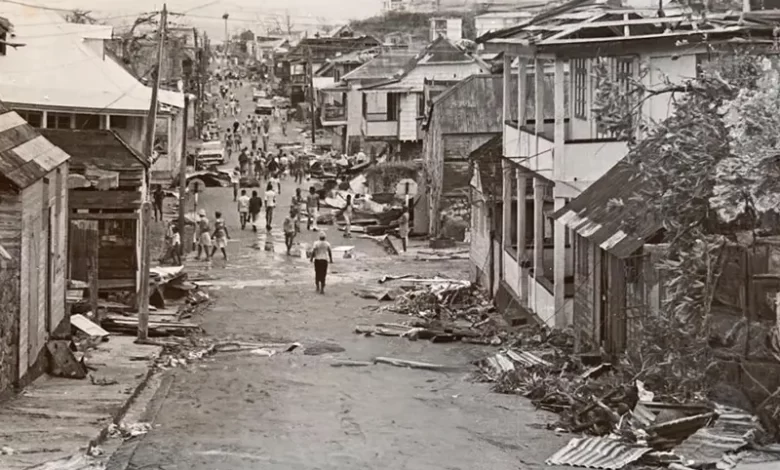Hurricane David (1979)

Hurricane David made landfall on August 29, 1979, during Dominica’s Hurricane Season as a Category 5 storm, profoundly affecting the island with its severe destruction. It landed with winds exceeding 150 mph, causing widespread devastation across the island, particularly in Roseau, the capital. This event is significant in Dominica’s history, showcasing the island’s vulnerability to natural disasters and the critical need for enhanced disaster preparedness.
Hurricane David Hits Dominica
Hurricane David’s projected path shifted in the days before its arrival, catching many off guard and emphasizing the unpredictable nature of such storms. This highlighted the importance of timely and effective communication in disaster response.
Hurricane David’s impact devastated Dominica and left it like a war zone. The storm damaged or destroyed 80% of the homes, rendering 75% of residents homeless and many more temporarily without shelter. Torrential rains transformed rivers into destructive forces, and the loss of power lines disrupted the water supply. Dominica’s agricultural sector, particularly the banana industry, suffered significant losses.
Hurricane David Recovery Efforts
The recovery efforts in the wake of Hurricane David highlighted the resilience of the Dominican people and the importance of community solidarity. It also prompted a reassessment of Dominica’s disaster preparedness strategies, leading to improvements in infrastructure and emergency response protocols. The Dominica Government and Political Parties, including the Dominica Freedom Party (DFP) and the Dominica Labour Party (DLP), played pivotal roles in the national recovery, demonstrating leadership and commitment to the island’s rehabilitation.
Hurricane David also impacted the island’s natural environment, significantly damaging Dominica’s ecological sites, including the Dominica Botanic Gardens and Morne Trois Pitons National Park. These areas are crucial for conservation and biodiversity, and their restoration was vital for Dominica’s environmental health and tourism industry.
Dominica’s Resilience after Hurricane David
For the people of Dominica, Hurricane David was a life-changing event that emphasized the power of community, resilience, and preparation. The storm’s devastation revealed the importance of disaster readiness and long-term sustainability while showing the strength of international solidarity. Support from regional neighbours and global partners was instrumental in rebuilding, reaffirming the need for collective action in times of crisis.
Hurricane David left an undeniable mark on the nation’s identity, serving as a testament to the resilience and determination of its people. The challenges faced and overcome have strengthened community ties, ensuring that Dominica remains united, prepared, and steadfast in the face of future uncertainties.




